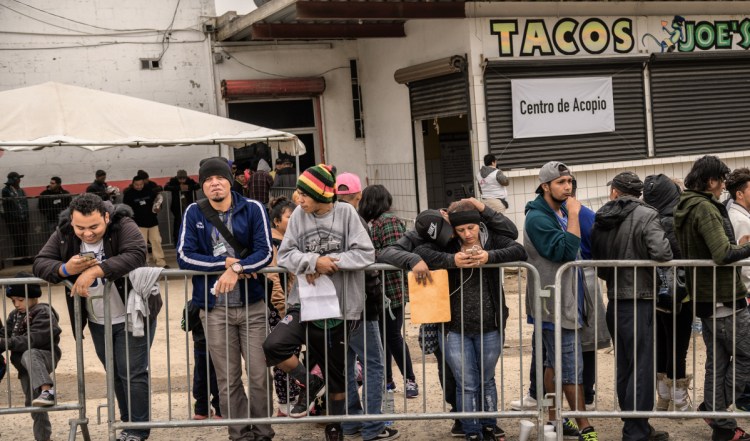TIJUANA, Mexico — The migrant caravans are stuck.
Thousands of Central Americans who traveled north to the U.S. border this fall, drawing dire warnings from President Trump, have settled into an uneasy existence in Tijuana, facing a backlash on both sides of the border.
Coordinators who helped direct the migrants through Mexico with bullhorns and advice have largely vanished and many of the migrants are frustrated, unsure what to do next.
“It’s like a house without the parents,” said Andrea Ramirez, 41, a Guatemalan who is living with her two daughters in El Barretal migrant shelter in Tijuana, where many caravan members have settled. “The children do whatever they want.”
Most importantly perhaps, the migrant caravans have not drawn the same sympathy or political support that some previous groups – such as the surge of unaccompanied minors in 2014 – did in either Mexico or the United States.
“I left my country because I thought this caravan was going to the United States,” said Jose Morenos, 49, who joined a caravan in Honduras after seeing a story on the news. “I would not have come here if I knew they’d stop in Mexico.”
It’s a sign of how little the groups understood the harsh political realities of immigration that they approached the border in November just as Americans were embroiled in a bitter midterm election campaign in which Trump falsely warned of a looming “invasion” of criminals and terrorists.
Since then, Trump has fought Congress over his demands for $5 billion for his border wall, keeping his immigration crackdown in the spotlight.
And the migrants’ chances of gaining legal entry into the United States have only worsened: On Thursday, Homeland Security Secretary Kirstjen Nielsen announced that asylum seekers will be forced to wait in Mexico while their cases are processed in the U.S., a dramatic policy shift.
Mexican officials initially registered about 6,000 migrants from the caravans at an emergency shelter less than 400 feet from the U.S. border, double the facility’s planned capacity.
Overcrowding and flooding prompted officials to shutter the shelter Nov. 29, pushing about 2,800 people into El Barretal. Others went to smaller shelters scattered in and around Tijuana.
Their presence has sparked protests in Tijuana – and some violence.
Mexican authorities have deported about 300 of the caravan members and helped about 700 more back to their home countries, according to the government. They say about 1,000 others illegally crossed the border, a figure that U.S. Customs and Border Protection officials dispute, though they wouldn’t provide their own figure. More than 1,000 people from the caravans have found jobs or been cleared to work in Mexico, while about 3,500 others have registered for work visas.
Nevertheless, the experience has been a bitter for many.
Carlos Garcia, 19, of Honduras was among those who believed he would cross the border that day. He even packed his bag for the journey.
“I thought they’d let us in and give us asylum,” he said. “They told us it would be beautiful. “Now that we are here, it is very different. They lied to us about everything.”
Send questions/comments to the editors.



Success. Please wait for the page to reload. If the page does not reload within 5 seconds, please refresh the page.
Enter your email and password to access comments.
Hi, to comment on stories you must . This profile is in addition to your subscription and website login.
Already have a commenting profile? .
Invalid username/password.
Please check your email to confirm and complete your registration.
Only subscribers are eligible to post comments. Please subscribe or login first for digital access. Here’s why.
Use the form below to reset your password. When you've submitted your account email, we will send an email with a reset code.